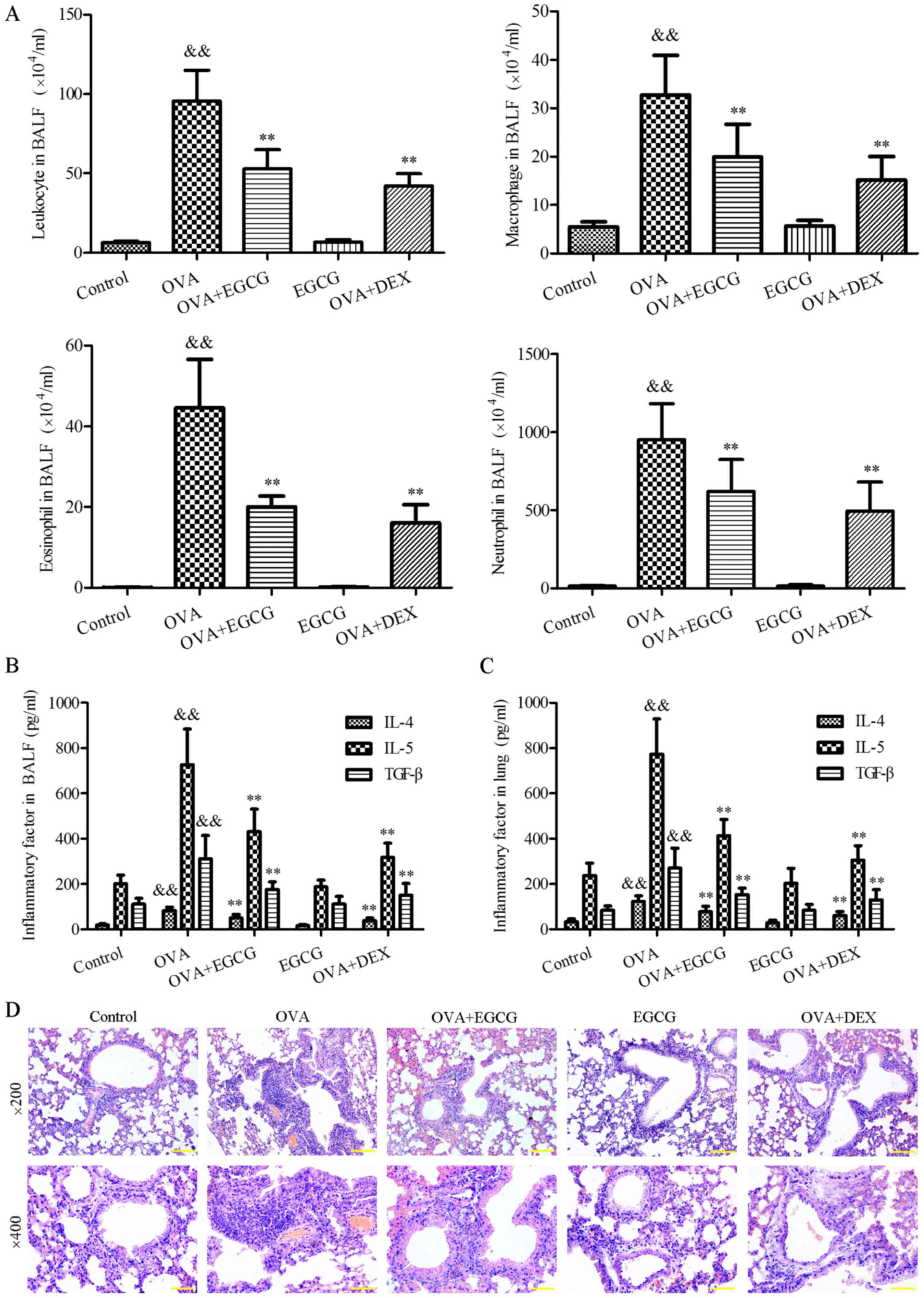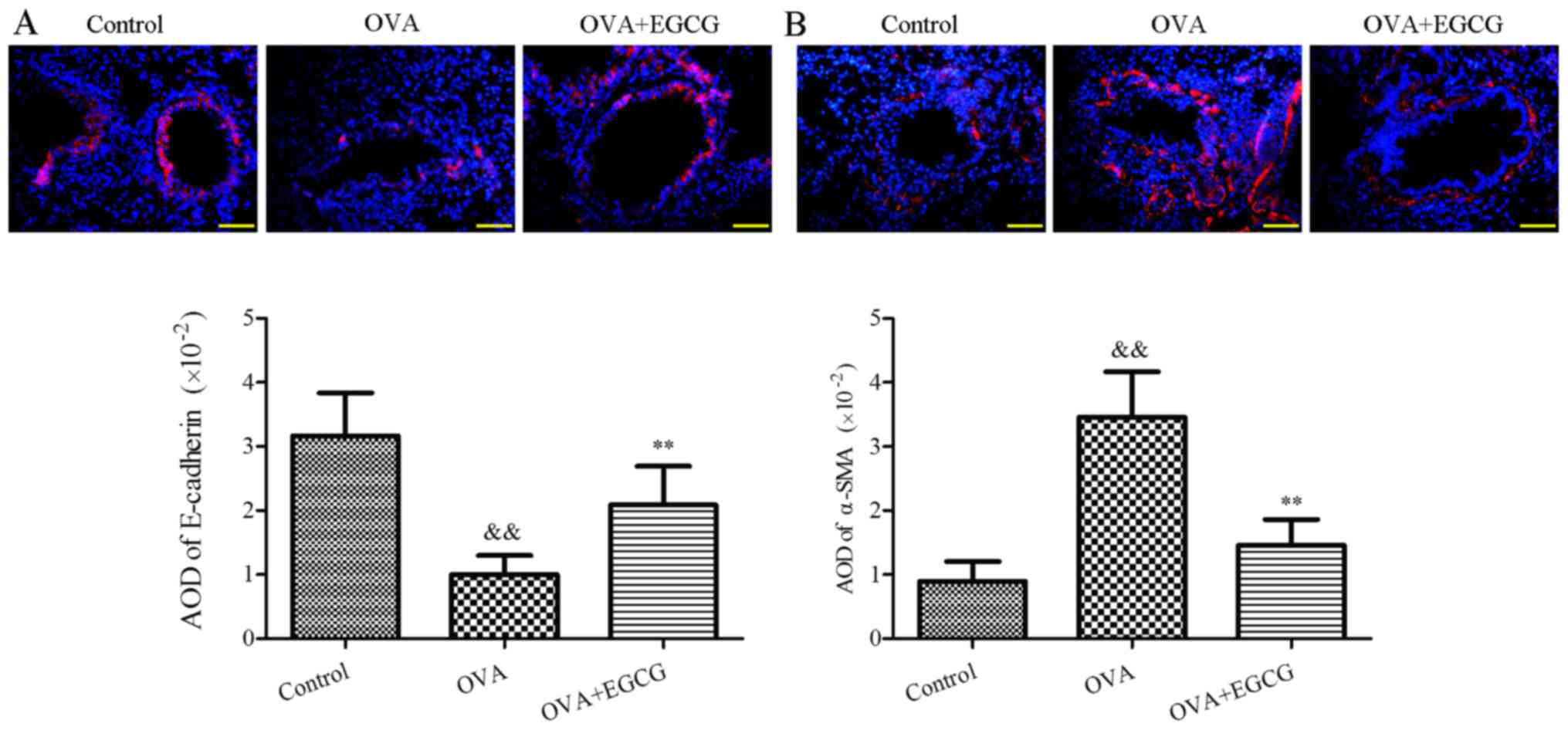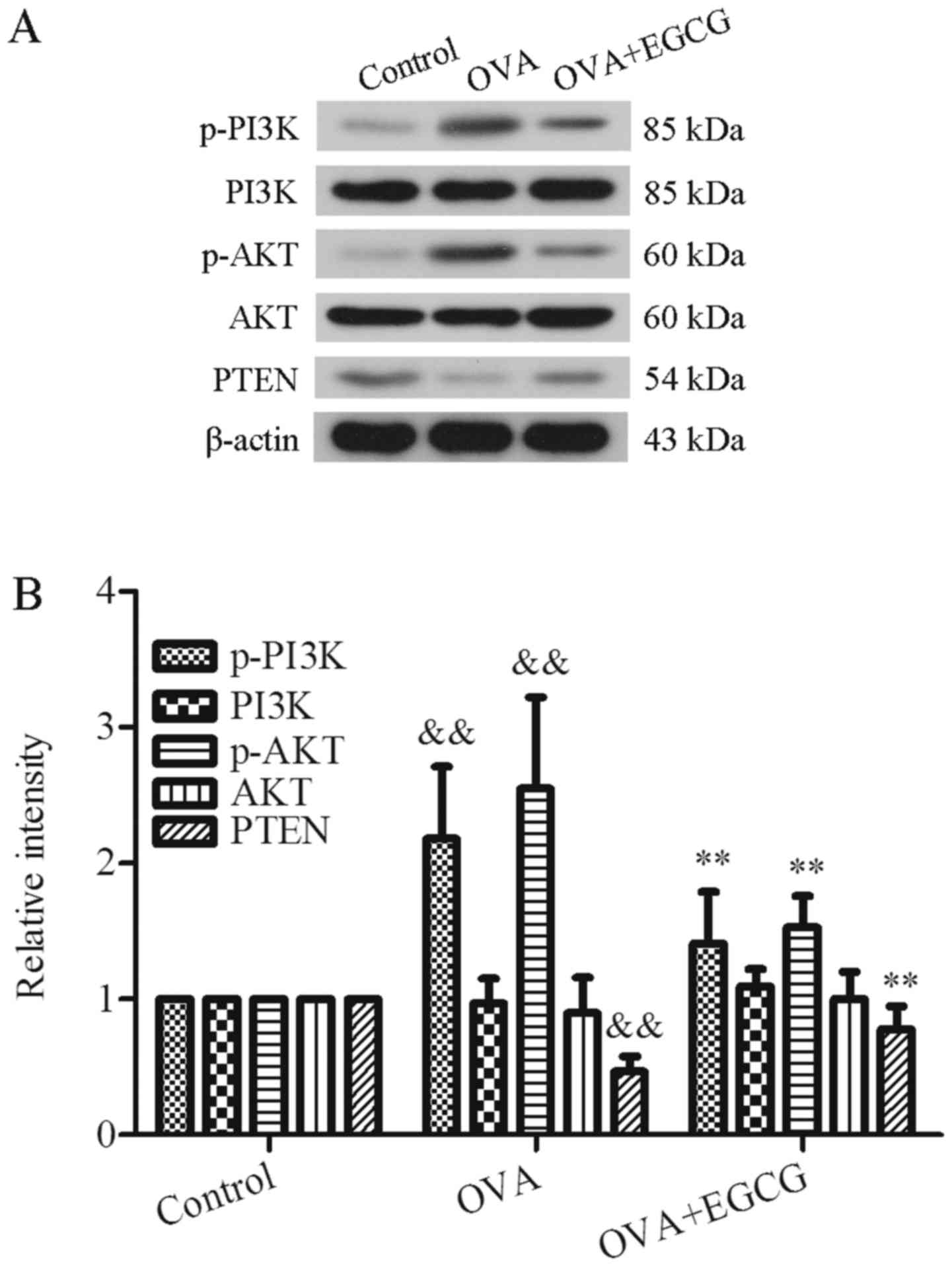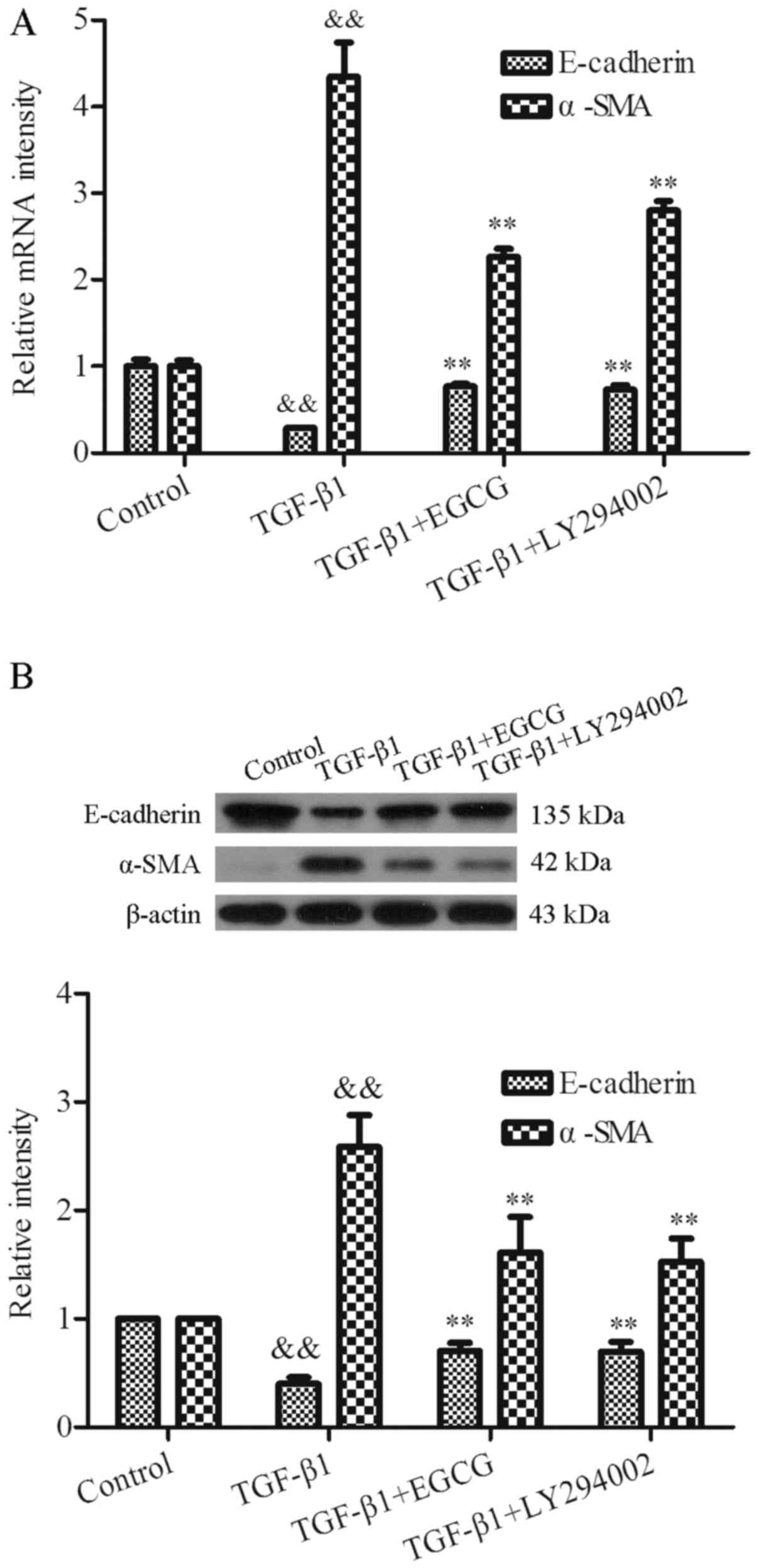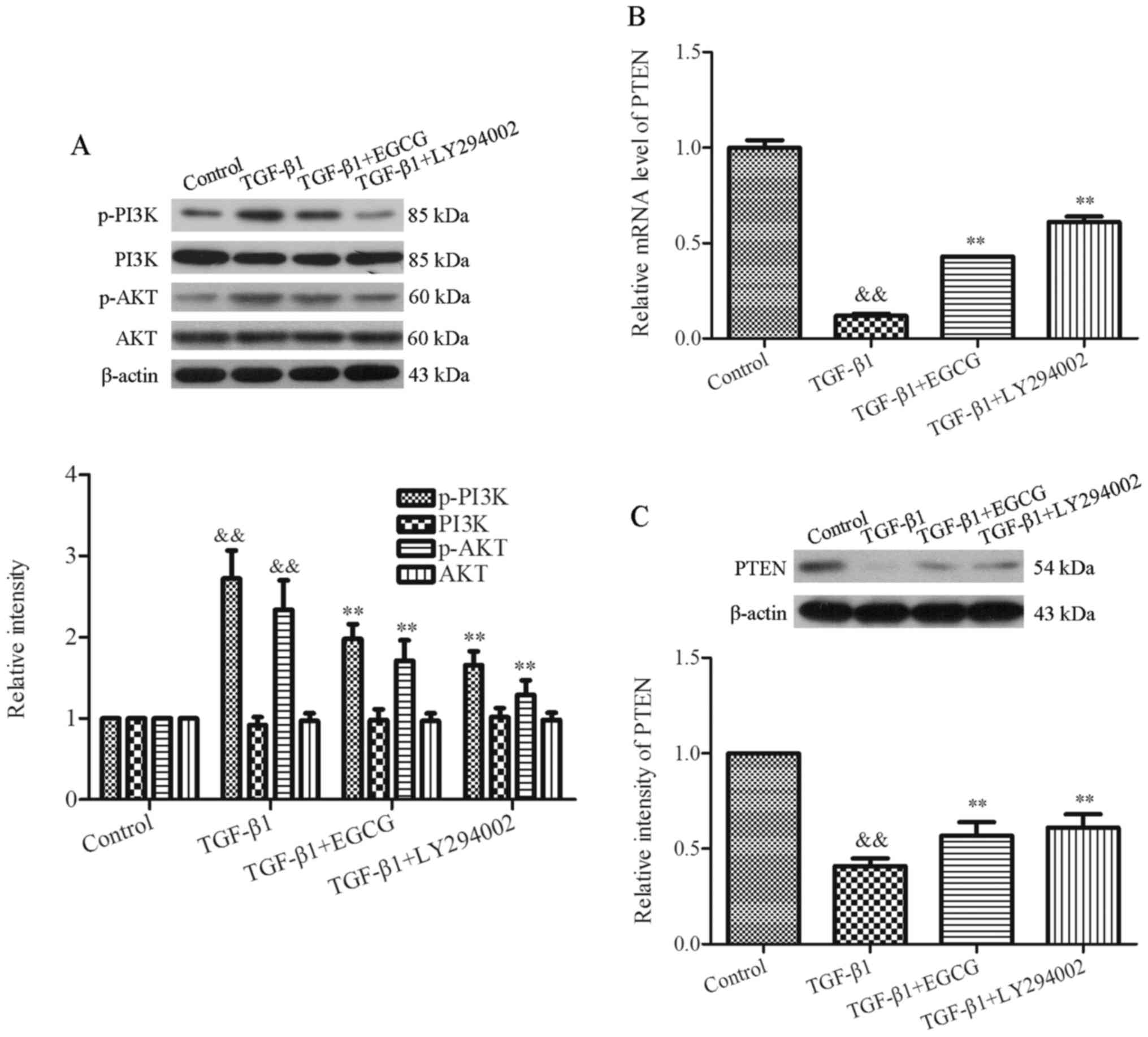|
1
|
Busse WW and Lemanske RF Jr: Asthma. N
Engl J Med. 344:350–362. 2001. View Article : Google Scholar : PubMed/NCBI
|
|
2
|
Global Asthma Network: The global asthma
report. 2014, http://www.globalasthmareport.org/resources/Global_Asthma_Report_2014.pdf.
Accessed Dec 22, 2016.
|
|
3
|
Lemanske RF Jr and Busse WW: 6. Asthma. J
Allergy Clin Immunol. 111(Suppl 2): S502–S519. 2003. View Article : Google Scholar : PubMed/NCBI
|
|
4
|
Fischer KD, Hall SC and Agrawal DK:
Vitamin D supplem entation reduces induction of
epithelial-mesenchymal transition in allergen sensitized and
challenged mice. PLoS One. 11. pp. e01491802016, View Article : Google Scholar
|
|
5
|
Thiery JP, Acloque H, Huang RY and Nieto
MA: Epithelial-mesenchymal transitions in development and disease.
Cell. 139:871–890. 2009. View Article : Google Scholar : PubMed/NCBI
|
|
6
|
Kalluri R and Weinberg RA: The basics of
epithelial-mesenchymal transition. J Clin Invest. 119:1420–1428.
2009. View
Article : Google Scholar : PubMed/NCBI
|
|
7
|
Massagué J: TGFbeta in cancer. Cell.
134:215–230. 2008. View Article : Google Scholar : PubMed/NCBI
|
|
8
|
Willis BC and Borok Z: TGF-beta-induced
EMT: mechanisms and implications for fibrotic lung disease. Am J
Physiol Lung Cell Mol Physiol. 293:L525–L534. 2007. View Article : Google Scholar : PubMed/NCBI
|
|
9
|
Kelly MM, O'Connor TM, Leigh R, Otis J,
Gwozd C, Gauvreau GM, Gauldie J and O'Byrne PM: Effects of
budesonide and formoterol on allergen-induced airway responses,
inflammation, and airway remodeling in asthma. J Allergy Clin
Immunol. 125:349–356. 2010. View Article : Google Scholar
|
|
10
|
Khan N and Mukhtar H: Multitargeted
therapy of cancer by green tea polyphenols. Cancer Lett.
269:269–280. 2008. View Article : Google Scholar : PubMed/NCBI
|
|
11
|
Suganuma M, Okabe S, Sueoka N, Sueoka E,
Matsuyama S, Imai K, Nakachi K and Fujiki H: Green tea and cancer
chemo-prevention. Mutat Res. 428:339–344. 1999. View Article : Google Scholar : PubMed/NCBI
|
|
12
|
Wang Y, Liu N, Su X, Zhou G, Sun G, Du F,
Bian X and Wang B: Epigallocatechin-3-gallate attenuates
transforming growth factor-beta1 induced epithelial-mesenchymal
transition via Nrf2 regulation in renal tubular epithelial cells.
Biomed Pharmacother. 70:260–267. 2015. View Article : Google Scholar : PubMed/NCBI
|
|
13
|
Van Aller GS, Carson JD, Tang W, Peng H,
Zhao L, Copeland RA, Tummino PJ and Luo L: Epigallocatechin gallate
(EGCG), a major component of green tea, is a dual
phosphoinositide-3-kinase/mTOR inhibitor. Biochem Biophys Res
Commun. 406:194–199. 2011. View Article : Google Scholar : PubMed/NCBI
|
|
14
|
Wu SY, Silverberg JI, Joks R, Durkin HG
and Smith-Norowitz TA: Green tea (Camelia sinensis) mediated
suppression of IgE production by peripheral blood mononuclear cells
of allergic asthmatic humans. Scand J Immunol. 76:306–310. 2012.
View Article : Google Scholar : PubMed/NCBI
|
|
15
|
Bani D, Giannini L, Ciampa A, Masini E,
Suzuki Y, Menegazzi M, Nistri S and Suzuki H:
Epigallocatechin-3-gallate reduces allergen-induced asthma-like
reaction in sensitized guinea pigs. J Pharmacol Exp Ther.
317:1002–1011. 2006. View Article : Google Scholar : PubMed/NCBI
|
|
16
|
Kimata H: Effect of viewing a humorous vs.
nonhumorous film on bronchial responsiveness in patients with
bronchial asthma. Physiol Behav. 81:681–684. 2004. View Article : Google Scholar : PubMed/NCBI
|
|
17
|
Shi J, Liu F, Zhang W, Liu X, Lin B and
Tang X: Epigallo-catechin-3-gallate inhibits nicotine-induced
migration and invasion by the suppression of angiogenesis and
epithelial-mesenchymal transition in non-small cell lung cancer
cells. Oncol Rep. 33:2972–2980. 2015. View Article : Google Scholar : PubMed/NCBI
|
|
18
|
Chen S, Xu Y, Chen Y, Li X, Mou W, Wang L,
Liu Y, Reisfeld RA, Xiang R, Lv D and Li N: SOX2 gene regulates the
transcriptional network of oncogenes and affects tumorigenesis of
human lung cancer cells. PLoS One. 7:e363262012. View Article : Google Scholar : PubMed/NCBI
|
|
19
|
Yadav UC, Naura AS, Aguilera-Aguirre L,
Ramana KV, Boldogh I, Sur S, Boulares HA and Srivastava SK: Aldose
redu-ctase inhibition suppresses the expression of Th2 cytokines
and airway inflammation in ovalbumin-induced asthma in mice. J
Immunol. 183:4723–4732. 2009. View Article : Google Scholar : PubMed/NCBI
|
|
20
|
Wang H, Quah SY, Dong JM, Manser E, Tang
JP and Zeng Q: PRL-3 down-regulates PTEN expression and signals
through PI3K to promote epithelial-mesenchymal transition. Cancer
Res. 67:2922–2926. 2007. View Article : Google Scholar : PubMed/NCBI
|
|
21
|
Kim SR, Lee KS, Park SJ, Min KH, Lee KY,
Choe YH, Lee YR, Kim JS, Hong SJ and Lee YC: PTEN down-regulates
IL-17 expression in a murine model of toluene diisocyanate-induced
airway disease. J Immunol. 179:6820–6829. 2007. View Article : Google Scholar : PubMed/NCBI
|
|
22
|
Liu S, Wang XJ, Liu Y and Cui YF:
PI3K/AKT/mTOR signaling is involved in
(-)-epigallocatechin-3-gallate-induced apoptosis of human
pancreatic carcinoma cells. Am J Chin Med. 41:629–642. 2013.
View Article : Google Scholar : PubMed/NCBI
|
|
23
|
Johnson JR, Roos A, Berg T, Nord M and
Fuxe J: Chronic respiratory aeroallergen exposure in mice induces
epithelial-mesenchymal transition in the large airways. PLoS One.
6. pp. e161752011, View Article : Google Scholar
|
|
24
|
Bakin AV, Tomlinson AK, Bhowmick NA, Moses
HL and Arteaga CL: Phosphatidylinositol 3-kinase function is
required for transforming growth factor beta-mediated epithelial to
mesenchymal transition and cell migration. J Biol Chem.
275:36803–36810. 2000. View Article : Google Scholar : PubMed/NCBI
|
|
25
|
Hackett TL, de Bruin HG, Shaheen F, van
den Berge M, van Oosterhout AJ, Postma DS and Heijink IH:
Caveolin-1 controls airway epithelial barrier function.
Implications for asthma. Am J Respir Cell Mol Biol. 49:662–671.
2013. View Article : Google Scholar : PubMed/NCBI
|
|
26
|
Fischer KD and Agrawal DK: Vitamin D
regulating TGF-β induced epithelial-mesenchymal transition. Respir
Res. 15:1462014. View Article : Google Scholar
|
|
27
|
Chang JZ, Yang WH, Deng YT, Chen HM and
Kuo MY: EGCG blocks TGFβ1-induced CCN2 by suppressing JNK and p38
in buccal fibroblasts. Clin Oral Investig. 17:455–461. 2013.
View Article : Google Scholar
|
|
28
|
Kim SH, Park HJ, Lee CM, Choi IW, Moon DO,
Roh HJ, Lee HK and Park YM: Epigallocatechin-3-gallate protects
toluene diisocyanate-induced airway inflammation in a murine model
of asthma. FEBS Lett. 580:1883–1890. 2006. View Article : Google Scholar : PubMed/NCBI
|
|
29
|
Pascual RM and Peters SP: Airway
remodeling contributes to the progressive loss of lung function in
asthma: an overview. J Allergy Clin Immunol. 116:477–487. 2005.
View Article : Google Scholar : PubMed/NCBI
|
|
30
|
Tagaya E and Tamaoki J: Mechanisms of
airway remodeling in asthma. Allergol Int. 56:331–340. 2007.
View Article : Google Scholar : PubMed/NCBI
|
|
31
|
Sumi Y and Hamid Q: Airway remodeling in
asthma. Allergol Int. 56:341–348. 2007. View Article : Google Scholar : PubMed/NCBI
|
|
32
|
Choi YS, Bae CH, Song SY and Kim YD: The
effect of epigallocatechin-3-gallate in allergic airway
inflammation. Rhinology. 52:406–412. 2014.PubMed/NCBI
|
|
33
|
Cho JY: Recent advances in mechanisms and
treatments of airway remodeling in asthma: a message from the bench
side to the clinic. Korean J Intern Med. 26:367–383. 2011.
View Article : Google Scholar : PubMed/NCBI
|
|
34
|
Royce SG, Cheng V, Samuel CS and Tang ML:
The regulation of fibrosis in airway remodeling in asthma. Mol Cell
Endocrinol. 351:167–175. 2012. View Article : Google Scholar : PubMed/NCBI
|
|
35
|
Lange-Sperandio B, Trautmann A, Eickelberg
O, Jayachandran A, Oberle S, Schmidutz F, Rodenbeck B, Hömme M,
Horuk R and Schaefer F: Leukocytes induce epithelial to mesenchymal
transition after unilateral ureteral obstruction in neonatal mice.
Am J Pathol. 171:861–871. 2007. View Article : Google Scholar : PubMed/NCBI
|
|
36
|
Minshall EM, Leung DY, Martin RJ, Song YL,
Cameron L, Ernst P and Hamid Q: Eosinophil-associated TGF-beta1
mRNA expression and airways fibrosis in bronchial asthma. Am J
Respir Cell Mol Biol. 17:326–333. 1997. View Article : Google Scholar : PubMed/NCBI
|
|
37
|
Boukhalfa G, Desmoulière A, Rondeau E,
Gabbiani G and Sraer JD: Relationship between alpha-smooth muscle
actin expression and fibrotic changes in human kidney. Exp Nephrol.
4:241–247. 1996.PubMed/NCBI
|
|
38
|
Cano A, Pérez-Moreno MA, Rodrigo I,
Locascio A, Blanco MJ, del Barrio MG, Portillo F and Nieto MA: The
transcription factor snail controls epithelial-mesenchymal
transitions by repressing E-cadherin expression. Nat Cell Biol.
2:76–83. 2000. View Article : Google Scholar : PubMed/NCBI
|
|
39
|
Makinde T, Murphy RF and Agrawal DK: The
regulatory role of TGF-beta in airway remodeling in asthma. Immunol
Cell Biol. 85:348–356. 2007. View Article : Google Scholar : PubMed/NCBI
|
|
40
|
Higaki M and Shimokado K:
Phosphatidylinositol 3-kinase is required for growth factor-induced
amino acid uptake by vascular smooth muscle cells. Arterioscler
Thromb Vasc Biol. 19:2127–2132. 1999. View Article : Google Scholar : PubMed/NCBI
|
|
41
|
Krymskaya VP, Hoffman R, Eszterhas A,
Ciocca V and Panettieri RA Jr: TGF-beta 1 modulates EGF-stimulated
phosphatidylinositol 3-kinase activity in human airway smooth
muscle cells. Am J Physiol. 273:L1220–L1227. 1997.
|
|
42
|
Zhang Y, He Q, Dong J, Jia Z, Hao F and
Shan C: Effects of epigallocatechin-3-gallate on proliferation and
differentiation of mouse cochlear neural stem cells: involvement of
PI3K/Akt signaling pathway. Eur J Pharm Sci. 88:267–273. 2016.
View Article : Google Scholar : PubMed/NCBI
|
|
43
|
Xuan F and Jian J: Epigallocatechin
gallate exerts protective effects against myocardial
ischemia/reperfusion injury through the PI3K/Akt pathway-mediated
inhibition of apoptosis and the restoration of the autophagic flux.
Int J Mol Med. 38:328–336. 2016. View Article : Google Scholar : PubMed/NCBI
|
|
44
|
Liu S, Xu ZL, Sun L, Liu Y, Li CC, Li HM,
Zhang W, Li CJ and Qin W: (-)-Epigallocatechin-3-gallate induces
apoptosis in human pancreatic cancer cells via PTEN. Mol Med Rep.
14:599–605. 2016. View Article : Google Scholar : PubMed/NCBI
|
|
45
|
Piek E, Moustakas A, Kurisaki A, Heldin CH
and ten Dijke P: TGF-(beta) type I receptor/ALK-5 and Smad proteins
mediate epithelial to mesenchymal transdifferentiation in NMuMG
breast epithelial cells. J Cell Sci. 112:4557–4568. 1999.PubMed/NCBI
|
|
46
|
Yap TA, Garrett MD, Walton MI, Raynaud F,
de Bono JS and Workman P: Targeting the PI3K-AKT-mTOR pathway:
progress pitfalls, and promises. Curr Opin Pharmacol. 8:393–412.
2008. View Article : Google Scholar : PubMed/NCBI
|
|
47
|
Tamura M, Gu J, Matsumoto K, Aota S,
Parsons R and Yamada KM: Inhibition of cell migration, spreading,
and focal adhesions by tumor suppressor PTEN. Science.
280:1614–1617. 1998. View Article : Google Scholar : PubMed/NCBI
|
|
48
|
Kwak YG, Song CH, Yi HK, Hwang PH, Kim JS,
Lee KS and Lee YC: Involvement of PTEN in airway
hyperresponsiveness and inflammation in bronchial asthma. J Clin
Invest. 111:1083–1092. 2003. View Article : Google Scholar : PubMed/NCBI
|
|
49
|
Hirsch E, Katanaev VL, Garlanda C,
Azzolino O, Pirola L, Silengo L, Sozzani S, Mantovani A, Altruda F
and Wymann MP: Central role for G protein-coupled phosphoinositide
3-kinase gamma in inflammation. Science. 287:1049–1053. 2000.
View Article : Google Scholar : PubMed/NCBI
|
|
50
|
Barenys M, Gassmann K, Baksmeier C, Heinz
S, Reverte I, Schmuck M, Temme T, Bendt F, Zschauer TC, Rockel TD,
et al: Epigallocatechin gallate (EGCG) inhibits adhesion and
migration of neural progenitor cells in vitro. Arch Toxicol.
91:827–837. 2017. View Article : Google Scholar
|















